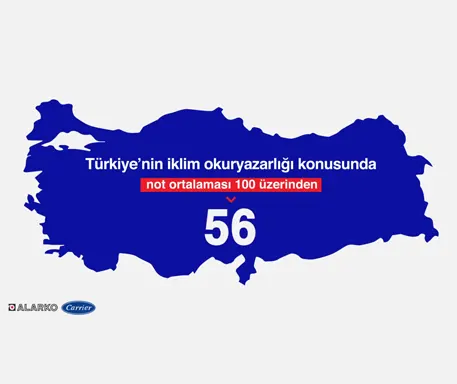Climate Literacy Survey by Alarko Carrier
01/03/2022

Alarko Carrier has carried out a comprehensive survey. The survey carried out by Twentify, one of the prestigious companies of the survey sector, aimed to measure the climate literacy level in Turkey. The survey ensuring regional and socio-economic representation across Turkey was carried out with 1,261 subjects. Thus, the survey results intended to generate data across the whole country.
About The Climate Literacy Level
According to the survey results, the average score of climate literacy in Turkey was 56 on a scale of 100. While 27% of the participants stayed below a score of 50 points, only 5% of the participants has reached a score over 75 points. It has been observed that as socio-economic level increased, the climate literacy also increased, but that there were not significant differences in terms of climate literacy between genders or age groups. One of the most striking data of the survey is that 87% of our citizens believe that necessary actions are not taken against the climate issue, which is in parallel to the global average, and the survey results are as follows:
Platforms Followed-up as Regards The Climate İssue
The answers given by people from outside the sector to the question of “How do you hear about the climate change” were mainly “from TV” and “from social media”. This answer highlights the fact that media has an important role in increasing the climate literacy.
What Climate Change Makes us Think of
Climate change evokes thoughts of “change in climate conditions”, “global warming” and “melting glaciers”. In other words, the term “climate” always evokes the thoughts of problems.
About the Greenhouse Gas, Carbon Footprint and Conventions on Climate Change
The awareness level on more technical concepts such as greenhouse gas emissions, carbon footprint and international climate conventions is not sufficient. Although we believe that necessary actions are not taken against the climate issue, we do not have sound opinion on international climate protocols. 69% of the participants state that they do not have an idea about these conventions.
Awareness Level
We have a high level of awareness about the climate issues that affect us in our daily life. The mostly recognized problems are the fact that “destruction of forests causes climate change”, and “climate change results in decreased agricultural products”.
Climate-Related Concerns
The anxiety is gradually increasing as we continue to feel the impact of the climate crisis. In addition, there has also been a recently-emerging
concept. We now have a brand new problem called “Eco-Anxiety” in English. The Special Report on Global Warming of 1.5 °C published by the Intergovernmental Panel on Climate Change (IPCC) upon examination of more than 6,000 scientific researches reveals a very important fact. If greenhouse gas emissions continue rising at their current rates, the global warming will exceed the increase limit of 1.5 °C between 2030 and
2052. This marks a point of no return for the whole planet. The survey reveals that although we are not familiar with the specific data, 86% of the public is concerned about the impact of climate change on future generations, whereas 87% believes that they will face draught in future. It is also evident that we do not believe that we can resolve the global climate crisis making use of state-of-the-art technologies.
Climate Change and Human Health
The participants with increased climate literacy agree more with the opinion that “climate has a direct impact on human health”. The concern about the future includes primarily the water issue. It is believed that infections and epidemics will increase with the depletion of water sources.
Concerns About the Nature Arising Together With Climate Change
The concerns arising as a result of climate change include primarily the depletion of water sources, increasing fires, elimination of agricultural sources and disruption of the ecosystem. This is believed to result in a negative impact on economy and tourism.
Reasons Behind Climate Change
We believe that the biggest factor responsible for climate change is human factor. The main factors resulting in climate change are listed as follows: “wastes discharged into the sea”, “gases leaking into the atmosphere from production plants”, “excessive consumption”, “unplanned urbanization” and excessive use of substances harming the nature such as “plastics”.

